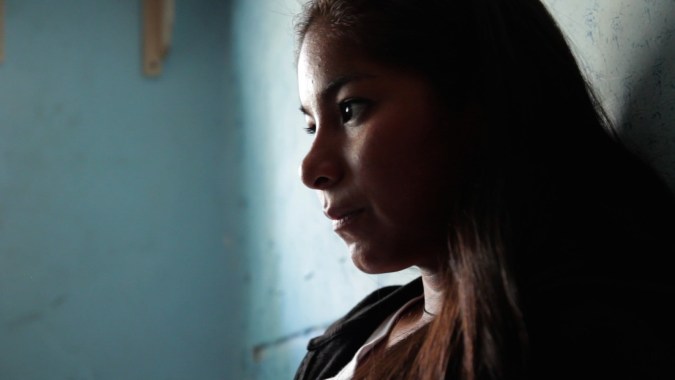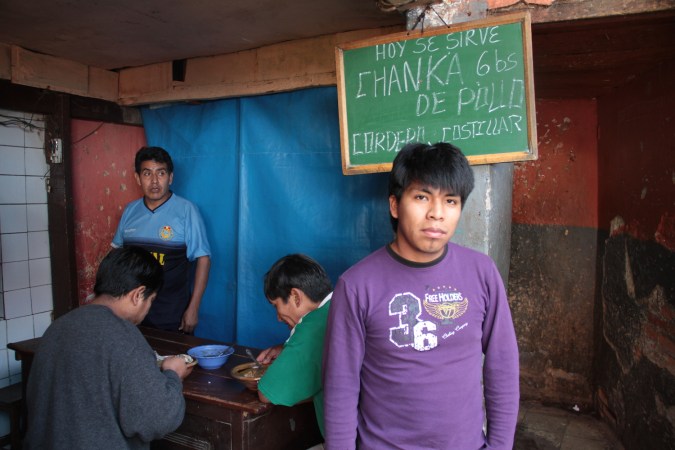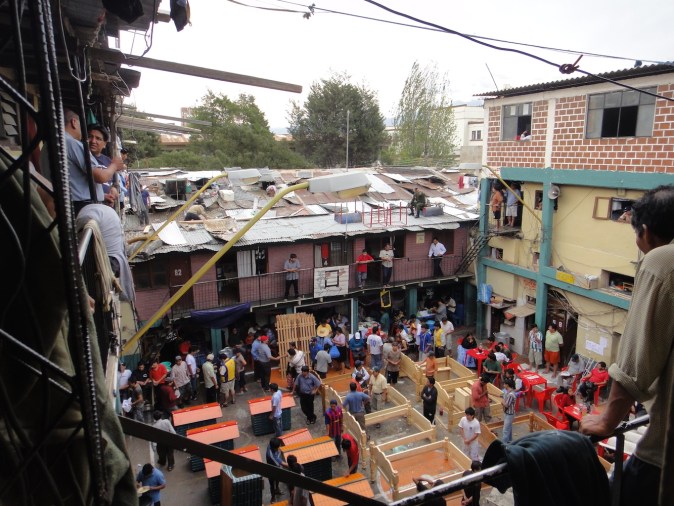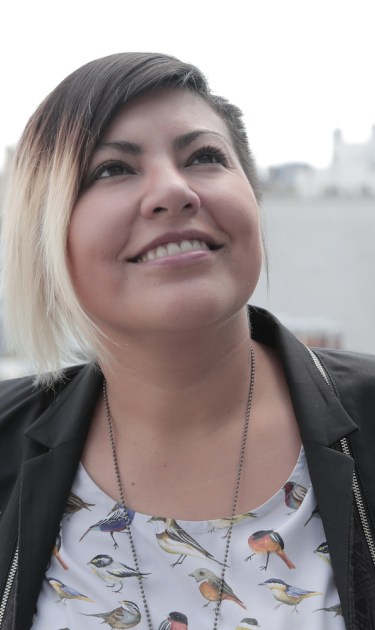Amid the celebrity profile documentaries and high-profile biopics that dotted the landscape of this year’s Toronto International Film Festival, Violeta Ayala’s Cocaine Prison was an extraordinary hunk of primary-source reportage: a documentary shot by the inhabitants of Bolivia’s San Sebastian Prison, five years in the making. Ayala – who hails from Cochabamba, up the street from San Sebastian – began work on the film as an English tutor within the prison, eventually entrusting digital cameras to two inmates named Mario and Hernan. These “little fish,” busted for trafficking cocaine across the border shared with Argentina, are the protagonists of Cocaine Prison (which goes, in Spanish, as Los Burritos); outside, Hernan’s sister Deisy navigates the labyrinthine legal proceedings.
What’s extraordinary about Ayala’s doc is its access (which is to say, the filmmaker’s capacity for building relationships), and the general unwillingness to play into easy audience emotions: Hernan and Deisy are active participants in a system that Ayala understands is untenable, but the camera never goes above ground-level. Many critics at TIFF were shocked at the good-naturedness of a movie with such bleak surroundings. In an impassioned discussion after the film’s world premiere, Ayala made no bones about the complicatedness of her subject matter. Here are some highlights from that interview.
On Beginning Work on Cocaine Prison
I wanted to tell a story about the drug trade from a different perspective. I was very tired of the Pablo Escobar narrative. The boss is not Pablo Escobar; the boss is your neighbor. Mario’s boss is an indigenous woman, she’s just one link up in the chain. That’s how it works. To get to the real drug trafficker, you have to come though hundreds of links, all little people.
“I wanted to tell a story about the drug trade from a different perspective. I was very tired of the Pablo Escobar narrative.”
The War on Drugs is what has created a balance, not just the drug trade. And it’s more insidious than that, because a lot of people are involved, and it’s a chain. I wanted to tell the story from my own perspective; where else will people tell stories from but prison? San Sebastian was two blocks away from the house where I grew up. I had never been inside. I remember when I was a teenager, I went there to look after the kids with a program. I went just one day and it was too difficult, too sad. I decided never to go back again, so I always had this idea in my head that I would go back to this place. And I wanted to teach English to these children, and they said, “Well, this isn’t a children’s prison, it’s a male prison.” Did I want to teach English to the prisoners? So we started there.
We used to go Monday thru Friday, and we had a movie club on Fridays. We started telling them and showing them the kind of work we do – we actually taught them English, taught them to read and write… A lot of them didn’t know. We just started to do this, which is how we met Mario and Hernan. Mario said, “You can’t get the whole thing that’s happening in my life, so why don’t you give me a little camera?” I said, why not. So I started giving cameras to Mario and Hernan, and then to Rolando… and soon after, we had a full crew.
On directing her collaborators within San Sebastian Prison
Towards the end, when we knew one of the characters was coming out, it was so frustrating because we couldn’t get a camera in – it was like, “Oh my God!” They would fill a card with footage, we’d download it and then give it back, and actually they deleted a lot of footage themselves – they only gave us what they wanted. And you know – you can get the footage back if you want to. We came very close to doing that, and then I realized it wasn’t my right to get footage the inmates didn’t wanna share with me. Mario didn’t delete as much as Hernan, but the other guys also deleted. We could give some direction to Rolando, but to Mario it was pointless. I said to Rolando, you really need to follow Mario and you really need to follow Hernan. A lot of times Hernan didn’t want to be filmed so we respected his rights.

On structuring the movie around Deisy’s attempts to free her brother
When we first met, she was really upset – she was this young girl, like sixteen, and she felt it was her fault Hernan was in prison. She felt that somehow, she wanted to be in a band with him and she felt like she knew better, she felt guilty, she really wanted him out. And she was upset because Hernan didn’t want to take destiny in his hands, so she’s a completely different person than her brother; when we met her, she looked up to him, and by the end of the film he looked up to her. Deisy had to find her own way and I think in a way, for me, being an indigenous woman, to look and talk like them makes this 1 to 1 relationship. They’re not expecting me to do or to fake anything.
I remember when Deisy went to look for a passport so she could move the drugs into Argentina, they told her she didn’t need one, I told her: are you sure? This is a good idea. She told me something like, “I need to save my brother. I just don’t see any other way.” And like, she really believed in fortune tellers – she believed in them more than she could believe in me or anyone else. A lot of them didn’t want us to shoot – they were really cagey, because this is a very private matter and you shouldn’t be shooting them reading the fortunes. Deisy would really trust what they had to say, so for me she had to go through her own journey to come out and realize, on her own terms, what she needed to do, what she could do – she was very bad at picking coca leaves, she could never pick enough to make a living, but she was good at reading and understanding concepts… when she took the exams to enter university, I didn’t even know if she would pass – I was surprised. I felt quite proud but I remember a week of studying with her, studying math, physics, chemistry, trying to understand – and she really, really wanted to do this.
On the legal system in Bolivia
Mario’s testimony didn’t change anything. It was funny because we had permission to shoot in court the first day, then the second day, one of the judges was sleeping, so they didn’t want us there anymore. Mario decided to tell the truth, but in doing that, he complicated the whole case for everyone else, because the police had lost all the evidence…So one lawyer is saying, “Come on – are you a chemist or what?” The prosecutor used his testimony to convict everyone else.

On stereotypes about the coca leaf
“Even in Bolivia, when I speak and write about my own identity, and the fact that I speak Quechua, the journalists never call me an indigenous filmmaker. It’s like they tried to erase my identity…”
It’s the same relationship as grapes and wine. Coca leaves are actually better than drinking coffee, because you don’t get the buzz, the headache – you just get a little happier, more alert. In Bolivia, it’s legal to have a certain amount for your family – but it’s not legal to have more, to make or transport cocaine. The biggest exporter of leaves in the world is Coca Coca, they take a ton of leaves in a legal way to the States and they sell it to pharmaceuticals.
This is why it’s very difficult to understand what Mario is doing wrong, because you’re not committing a crime until you get caught. In this chain, it seems harmless. in Bolivia, they talk about coming and shooting you but they don’t do it – you shoot someone, you’re going to prison for 30 years. For real. The chances of you getting caught for that are minimal. 700 people are inside San Sebastian, maybe 350 for cocaine related charges. And yet how much is exported from Bolivia every year? I met someone in the US who told me they took 500 kilos a week from Cochabamba, my home town. You have to be very, very unlucky to get caught. For me these arrests are just the excuse for the War on Drugs to keep going.
In the three years I’ve been shooting, I’ve never seen a big fish. One guy who came in, I saw on TV that he was caught with a ton of cocaine in a truck, but he was in prison for a week. So who are governments targeting? It’s the same in the US – I have not seen one banker convicted for laundering money. If you wanna follow the drug trade, follow the money. No one wants it to end – there’s just too much money involved.
On Evo Morales’ policy towards coca
I was really happy the day he became president of Bolivia. But he hasn’t changed the laws; the changes being reviewed in Parliament are even more targeting the little guys. In the US you can say “that person has drugs!” and they have to prove their innocence from prison. In Bolivian law, you get the same sentence whether you’re caught with 2 kilos or 200 – it’s insane. Morales had 10 years to change policy. He did kick out the DEA, and that’s brilliant – I grew up seeing people getting shot from my grandmother’s farm, people being taken and beaten up by the police, it was terrible. He did stop the violence but he hasn’t stopped the laws that change the mentality.
The people from Chaparre are an indigenous group who has lived in the jungle for 14,000 years. Evo Morales just signed a law to take away their sovereignty and wants to put a highway in the middle. Chinese companies are interested in buying the coca leaves, the oil, the wood, even the teeth of the puma. There’s a big conflict between the cocaleros from Chapare and the indigenous groups in the interior – some of them are against the highway, the whole civil society in Bolivia. We are living in a very complex time. Not the Spanish, in 500 years of colonization, dared to touch the Amazonas – and yet our first indigenous president is the one who’s gonna take away the sovereignty of the indigenous people of the lowlands.

On Losing Faith in Bolivia’s First Indigenous President
When I started the film I really, really believed – “Abra cadabra, it’s a new country!” I didn’t think Morales would fall in love with power like he has. He’s trying to change the constitution; we told him NO, the NO vote won, we told him “you have to go in 2019”, but he says everything is a plot of the United States. If his wife left him, it would be because the gringos came to Bolivia! It’s a little bit like Trump, in this populist sense – he’s trying to appeal to the lowest common feelings of people: greed and fear. So, I believe we won’t have long lasting democracies in Latin America until the War on Drugs ends. The drug trade is illegal; it runs on corruption. We don’t want the Americans to come back into Bolivia and kill our people; at the same time, we don’t want the Chinese to buy our resources. We have changed one colonial power for another.
On Reclaiming Indigenous Narratives
“[I’m] tired of seeing my people as stupid, or angelic, or lacking humanity, uncaring about relationships…”
That was a challenge for me – while making the film and editing even in Paris, a lot people working with us were like “I need context!” So I had to be very strong in saying no. You don’t get into this world through a film; if you want to understand it, you have to come through us. And if you don’t want to understand us, that’s okay – I don’t care! [Laughs] At some point we had a lot of text for the film, a lot of statistics, a lot of things that would explain their point of view. Then I realized: this is ridiculous. This is a film from the inside. In any country in the world, filmmaking is elitist. So the majority of Bolivian filmmakers are white, from more European backgrounds. I met a filmmaker who told me, “I’m very happy that everyone thinks I shot my film in Italy.” I was like, that’s not the point! So, we are still a very colonized country, and it has to change – our mentality has to find its own narratives, its own pace. And yes – Deisy, Hernan and Mario are young people, they’re much more reserved than the people in the city, they show their emotions a lot less; this is the way they are. It’s part of our idiosyncrasy. I couldn’t make them say things because I needed to explain to the world. I tried as much as I could, but that was a point. I feel we need to reclaim our stories because we understand the complexity like a foreigner won’t. We have great filmmakers: Juan Carlos Valdivia, I love, but he’s a white filmmaker. Latinos are not a race. There are many ethnic groups speaking the same language. Within the communities, we face a lot of racism. You see the Latinos at a film festival, they are majority white. Now, my grandfather was a Serbian Jew who escaped the war, my grandmother is indigenous. And this has given me privilege. I am a liar if I don’t admit it. Filmmakers like Deisy, Hernan, Mario – they are taking ownership of what they are doing. I think the cheapness of cameras today is changing things. Furthermore, our points of reference in cinema are what others have done, about us – so we are always trying to portray the Andean person as stupid and poor. You don’t even know – in Bolivia, people in the mountains have hundreds of llamas. Poverty is not just what you see. I know a woman who sells potatoes in the market in Cochabamba, and her kids are studying in Australia and the United States. It’s a different concept of the world. It makes me wonder what civilization really is, because for many many years, we believed that the white man brought it to us. Now we realize we’ve been living their for 14,000 years, and we were better able to successfully construct our societies without destroying the environment. Aboriginal people lived on Australia for 80,000 years and now in less than 200, the white man is destroying the environment, so… who was more civilized?
Even in Bolivia, when I speak and write about my own identity, and the fact that I speak Quechua, the journalists never call me an “indigenous filmmaker.” It’s like they tried to erase my identity or felt embarrassed themselves. Just the last year, I was profiled and I insisted on being described as an indigenous person – otherwise I wouldn’t let them use my name, my image, nothing. And that’s the first time the journalists have included that. In Morales’ cabinet, a lot of long-time politicians have suddenly become Socialists and begun using indigenous causes. He is like any other president – part of racism is also to idealize a country, a national identity. These communities are so complex – the Quechuas and Aymaras are responsible for colonizing smaller groups, taking their land and doing things that even the Spanish were afraid to do. Now, we have the most untouched jungles in the world and we’re about to blow it all up. One group that thinks they are better is doing it themselves. So in every community we have good and bad people, so for me this is part of the problem with idealization. That’s why I wanted to make the movie: Hernan didn’t do it because he had nothing to eat. He wanted to be in a band… even if he had no musical talent! So this is part of it, [I’m] tired of seeing my people as stupid, or angelic, or lacking humanity, uncaring about relationships… this is a brother and sister like any other family in the world. That’s why for me, the film has a very steady pace – my earlier films were fast, and this one found its own rhythm. It has no explanations. If you want a violent film or a film to show in school, this is not the one – but it may make you understand more about something you think is familiar, the drug trade, and see it from a new point of view.




